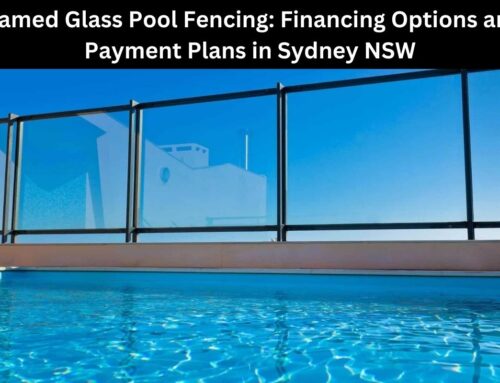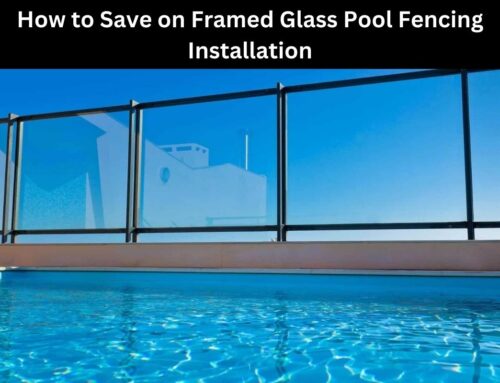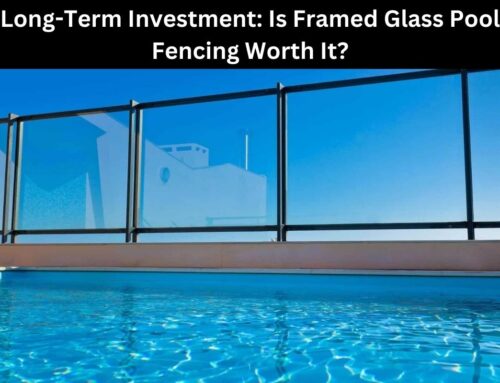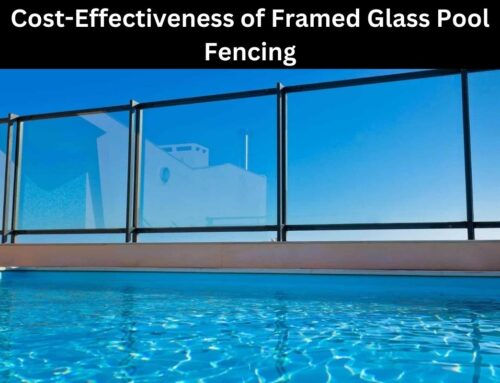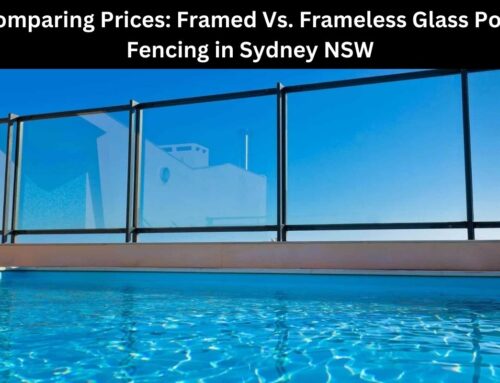Table of Contents
In today’s fast-paced society, where leisure and relaxation are highly valued, swimming pools have become an integral part of many households. As the demand for pool installations grows, the need for safety measures has become increasingly important.
Frameless glass pool fences, with their sleek and modern design, have gained popularity as an aesthetically pleasing option that also ensures the safety of pool users. However, accidents can still occur if proper precautions are not taken. This article aims to provide a comprehensive guide on safety measures for frameless glass pool fences, catering to an audience that prioritizes safety.
From selecting the appropriate glass thickness to installing self-closing gates and ensuring proper height and gap requirements, this article will delve into the key aspects that contribute to a secure pool environment.
Regular inspections, maintenance, and the use of non-slip surfaces around the pool are also crucial for maintaining safety.
Lastly, educating and supervising children around the pool area will further reduce potential risks. By implementing these safety measures, individuals can enjoy their pool experience with peace of mind, knowing that their loved ones are protected.
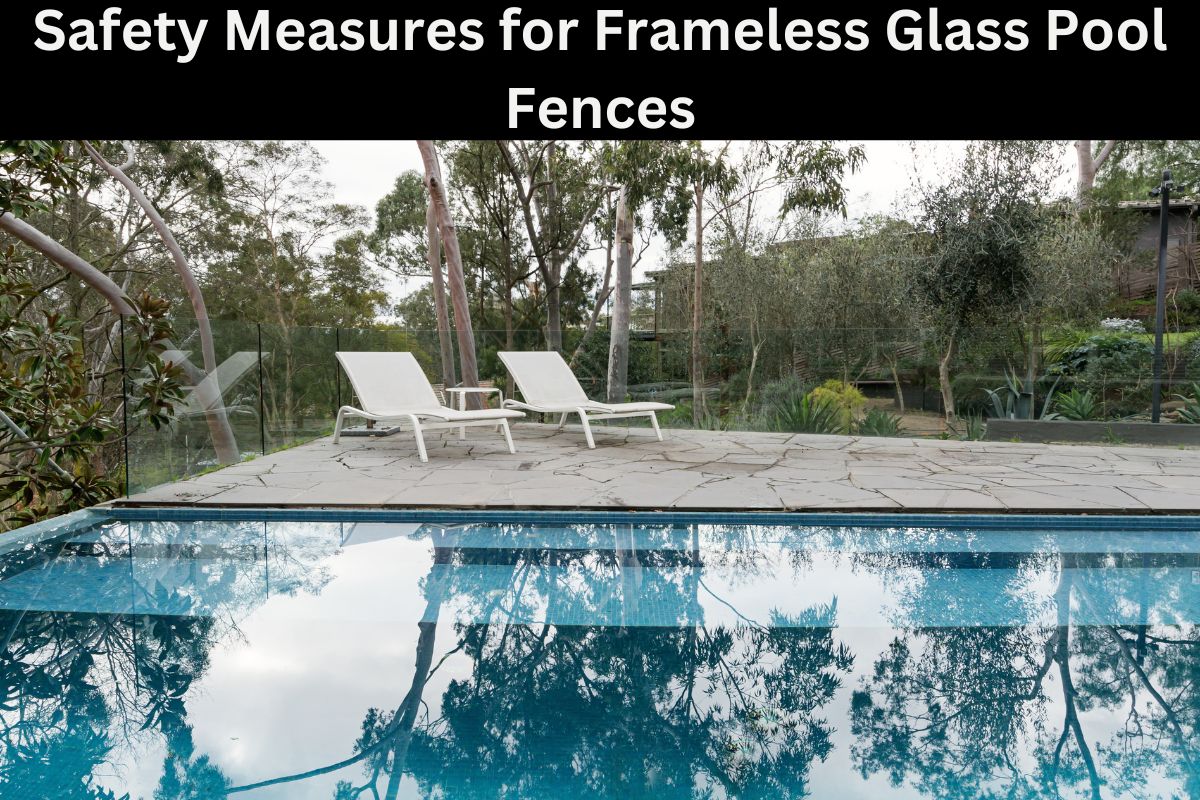
Key Takeaways
- Selecting the appropriate glass thickness is crucial for safety and structural integrity.
- Self-closing gates should be installed for proper functionality and safety.
- Proper height and gap requirements should be followed for the fence.
- Regular inspection and maintenance of the fence are essential for its effectiveness.
Select the Appropriate Glass Thickness
The selection of an appropriate glass thickness for frameless glass pool fences is crucial in ensuring the safety and security of individuals, evoking a sense of peace of mind and confidence in the structural integrity of the barrier.
When choosing the glass thickness, it is essential to consider factors such as the height and length of the fence, local building codes, and the presence of any potential risks or hazards in the surrounding environment.
A thicker glass panel offers greater strength and durability, which enhances the overall safety of the pool fence. It can withstand external forces, such as strong winds or accidental impacts, without compromising its integrity. The recommended minimum thickness for frameless glass pool fences is 12 millimeters, as per industry standards. However, for higher fences or areas prone to extreme weather conditions, opting for thicker glass panels, such as 15 or 19 millimeters, may provide an added layer of security.
By selecting an appropriate glass thickness, pool owners can ensure that their frameless glass pool fences meet the necessary safety requirements. The right thickness not only enhances the structural integrity of the barrier but also contributes to its ability to withstand external forces and potential risks.
Once the glass thickness has been determined, the next step is to install self-closing gates, which further enhances the safety measures of the pool fence.
Install Self-Closing Gates
To ensure proper functionality and adherence to safety standards, self-closing gates should be installed as part of the overall safety protocol for pool enclosures. These gates are designed to automatically close and latch behind individuals as they enter or exit the pool area. By incorporating self-closing gates into the design of frameless glass pool fences, the risk of the gate being left open or unlatched is significantly reduced. This helps prevent unauthorized access to the pool, especially by children or pets who may wander into the area unsupervised.
Here are four important reasons why self-closing gates are a crucial safety measure for frameless glass pool fences:
- Prevents accidental gate openings: Self-closing gates utilize a spring-loaded mechanism that ensures the gate automatically closes after each use, minimizing the chances of accidental gate openings.
- Promotes convenience: Self-closing gates provide a convenient way for individuals to enter and exit the pool area without the need to manually close and latch the gate behind them.
- Enhances security: With self-closing gates, the pool area remains securely enclosed, preventing unauthorized access and reducing the risk of accidents or drowning incidents.
- Supports compliance with safety regulations: Many safety regulations and codes require the installation of self-closing gates for pool enclosures, making them an essential component of a compliant and safe pool environment.
To further ensure the safety of individuals using the pool area, it is important to also consider the proper height and gap requirements for frameless glass pool fences.
Ensure Proper Height and Gap Requirements
Optimal dimensions play a pivotal role in ensuring a harmonious balance between security and aesthetic appeal in pool enclosures. When it comes to frameless glass pool fences, it is crucial to ensure proper height and gap requirements.
The height of the fence should be sufficient to prevent children from climbing over it and gaining access to the pool area unsupervised. Generally, a minimum height of 1200mm is recommended for frameless glass pool fences, although local regulations may vary.
Moreover, care should be taken to ensure that there are no gaps or spaces in the fence that could allow a child to squeeze through or get their head stuck. It is important to follow the guidelines provided by the relevant safety standards to determine the appropriate gap requirements for the specific type of glass used.
By adhering to these height and gap requirements, the risk of accidents and unauthorized access to the pool area can be significantly reduced.
In the next section, we will discuss the importance of regularly inspecting and maintaining the fence to ensure its continued effectiveness in providing safety and security.
Regularly Inspect and Maintain the Fence
Regular inspection and maintenance of the fence is essential to ensure its longevity and effectiveness in providing a secure barrier around the pool area. By regularly inspecting the frameless glass pool fence, any potential issues or weaknesses can be identified and addressed promptly, minimizing the risk of accidents or breaches.
It is recommended to inspect the fence at least once a month, or more frequently if the pool area is frequently used.
During the inspection, attention should be paid to the condition of the glass panels, the integrity of the supporting hardware, and any signs of wear or damage. Any cracks, chips, or loose fittings should be immediately repaired or replaced to maintain the structural integrity of the fence. Additionally, the gate mechanism should be checked to ensure it is functioning properly and securely latching.
Regular maintenance of the frameless glass pool fence is equally important. This includes cleaning the glass panels to remove any dirt, grime, or mineral buildup. A mild detergent or glass cleaner can be used along with a non-abrasive cloth or sponge. The hardware should also be regularly lubricated to prevent rust and ensure smooth operation.
By regularly inspecting and maintaining the frameless glass pool fence, pool owners can ensure the safety and security of their pool area.
In the subsequent section, we will discuss the importance of using non-slip surfaces around the pool to further enhance the safety measures.
Use Non-Slip Surfaces Around the Pool
Using non-slip surfaces around the pool area creates a secure and stable environment, reducing the risk of slips and falls. These surfaces, such as rubberized mats or textured tiles, offer enhanced traction and grip, ensuring that individuals can move around the pool area safely.
The application of non-slip surfaces is particularly important in areas prone to wetness, such as around the pool or in the vicinity of water features. By reducing the likelihood of accidents caused by slipping, these surfaces play a crucial role in maintaining the overall safety of the pool area.
Non-slip surfaces offer several advantages. First and foremost, they provide a secure footing, preventing individuals from losing their balance and falling into the pool. Moreover, these surfaces are resistant to water and are specifically designed to minimize the risk of slipping, even when wet. This is especially important in a pool setting where water splashes and wet feet are common occurrences. Furthermore, non-slip surfaces are durable and resistant to wear, ensuring their long-term effectiveness in enhancing safety.
Transitioning into the subsequent section about ‘educate and supervise children around the pool area,’ it is important to note that non-slip surfaces are just one aspect of ensuring a safe pool environment. In order to prevent accidents and promote a secure atmosphere, it is essential to also educate and supervise children around the pool area.
Educate and Supervise Children around the Pool Area
To ensure a secure pool environment, it is crucial to educate and closely supervise children in the pool area, fostering a sense of responsibility and awareness that can help prevent accidents. By implementing the following measures, parents and guardians can significantly reduce the risk of incidents occurring:
- Teach children about water safety from an early age, emphasizing the importance of not running near the pool, not diving into shallow water, and not pushing others into the pool.
- Enroll children in swimming lessons to develop their swimming skills and water confidence. Ensure they are aware of their limitations and never allow them to swim alone.
- Establish clear rules for pool usage, such as no horseplay or roughhousing, no swimming without adult supervision, and no entering the pool area without permission.
- Maintain constant supervision when children are around the pool, especially those who are not strong swimmers or are unable to swim. Designate a responsible adult to act as a designated pool watcher to ensure their undivided attention.
By implementing these measures, parents can create a safer pool environment and instill good safety habits in children, reducing the risk of accidents and promoting a culture of water safety.
Majestic Glass: Excellence in Frameless Pool Fencing
Experience the perfect synergy of safety and style with Majestic Glass’s professional frameless glass pool fences in Sydney. We are dedicated to crafting secure pool spaces without compromising on aesthetic appeal. Our team uses the highest quality glass, ensuring both durability and aesthetic value. For more insights into our services, visit our main services page where we elaborate on our commitment to excellence, our detailed processes, and the distinct benefits of a Majestic Glass frameless pool fence. Our mission is to turn your pool space into a secure and visually stunning landscape.
Frequently Asked Questions on Safety Measures for Frameless Glass Pool Fences
Are frameless glass pool fences suitable for all types of pools?
Frameless glass pool fences are suitable for most types of pools. They offer unobstructed views, enhance the aesthetic appeal, and provide a secure barrier. However, factors such as local regulations, pool design, and maintenance requirements should be considered to ensure their suitability.
How often should I inspect and maintain my frameless glass pool fence?
Inspect and maintain frameless glass pool fences regularly to ensure their safety and effectiveness. By conducting routine inspections and addressing any issues promptly, you can prevent accidents and maintain a secure swimming environment.
Can I install a frameless glass pool fence myself or should I hire a professional?
It is recommended to hire a professional for the installation of a frameless glass pool fence to ensure proper and secure installation. Professionals have the expertise and knowledge to correctly install the fence, minimizing the risk of accidents and ensuring the safety of users.
Are there any specific safety regulations or requirements for frameless glass pool fences?
Safety regulations and requirements for frameless glass pool fences are essential to ensure the protection of individuals, particularly children, from potential accidents. Compliance with local building codes and standards is crucial to guaranteeing the effectiveness and reliability of these safety barriers.
Are frameless glass pool fences more expensive than traditional pool fences?
Frameless glass pool fences are generally more expensive than traditional pool fences. The cost is higher due to the use of high-quality materials and the need for specialized installation techniques. However, frameless glass pool fences offer a modern and sleek aesthetic while still providing safety for the pool area.
Conclusion
In conclusion, ensuring the safety of frameless glass pool fences requires careful consideration and adherence to specific guidelines.
By selecting the appropriate glass thickness, installing self-closing gates, and maintaining proper height and gap requirements, the risk of accidents can be significantly reduced.
Regular inspections and maintenance, along with the use of non-slip surfaces, further enhance the safety measures.
Additionally, educating and supervising children around the pool area is crucial to prevent any unforeseen incidents.
By implementing these measures, a secure and enjoyable pool environment can be created.
Related Articles
Cleaning and Maintenance Tips for Frameless Glass Pool Fences

